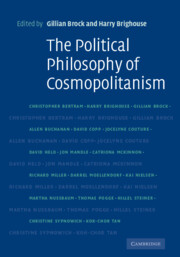Book contents
- Frontmatter
- Contents
- List of contributors
- Preface
- 1 Introduction
- 2 Principles of cosmopolitan order
- 3 Territorial justice and global redistribution
- 4 International justice and the basic needs principle
- 5 Cosmopolitans, cosmopolitanism, and human flourishing
- 6 Global justice, moral development, and democracy
- 7 A cosmopolitan perspective on the global economic order
- 8 In the national interest
- 9 Cosmopolitan respect and patriotic concern
- 10 Persons' interests, states' duties, and global governance
- 11 The demands of justice and national allegiances
- 12 Cosmopolitanism and the compatriot priority principle
- 13 Beyond the social contract: capabilities and global justice
- 14 Tolerating injustice
- 15 Cosmopolitan hope
- Bibliography
- Index
13 - Beyond the social contract: capabilities and global justice
Published online by Cambridge University Press: 04 December 2009
- Frontmatter
- Contents
- List of contributors
- Preface
- 1 Introduction
- 2 Principles of cosmopolitan order
- 3 Territorial justice and global redistribution
- 4 International justice and the basic needs principle
- 5 Cosmopolitans, cosmopolitanism, and human flourishing
- 6 Global justice, moral development, and democracy
- 7 A cosmopolitan perspective on the global economic order
- 8 In the national interest
- 9 Cosmopolitan respect and patriotic concern
- 10 Persons' interests, states' duties, and global governance
- 11 The demands of justice and national allegiances
- 12 Cosmopolitanism and the compatriot priority principle
- 13 Beyond the social contract: capabilities and global justice
- 14 Tolerating injustice
- 15 Cosmopolitan hope
- Bibliography
- Index
Summary
But among the traits characteristic of the human being is an impelling desire for fellowship, that is for common life, not of just any kind, but a peaceful life, and organized according to the measure of his intelligence, with those who are of his kind … Stated as a universal truth, therefore, the assertion that every animal is impelled by nature to seek only its own good cannot be conceded.
Hugo-Grotius, On the Law of War and PeaceGlobal inequalities in income increased in the 20th century by orders of magnitude out of proportion to anything experienced before. The distance between the incomes of the richest and poorest country was about 3 to 1 in 1820, 35 to 1 in 1950, 44 to 1 in 1973 and 72 to 1 in 1992.
Human Development Report 2000, United Nations Development ProgrammeA WORLD OF INEQUALITIES
A child born in Sweden today has a life expectancy at birth of 79.7 years. A child born in Sierra Leone has a life expectancy at birth of 38.9 years. In the US, GDP per capita is $34,142 dollars, in Sierra Leone, GDP per capita is $490. Adult literacy rates in the top twenty nations are around 99 percent. In Sierra Leone, the literacy rate is 36 percent. In twenty-six nations, the adult literacy rate is under 50 percent.
The world contains inequalities that are morally alarming, and the gap between richer and poorer nations is widening.
- Type
- Chapter
- Information
- The Political Philosophy of Cosmopolitanism , pp. 196 - 218Publisher: Cambridge University PressPrint publication year: 2005
- 15
- Cited by



